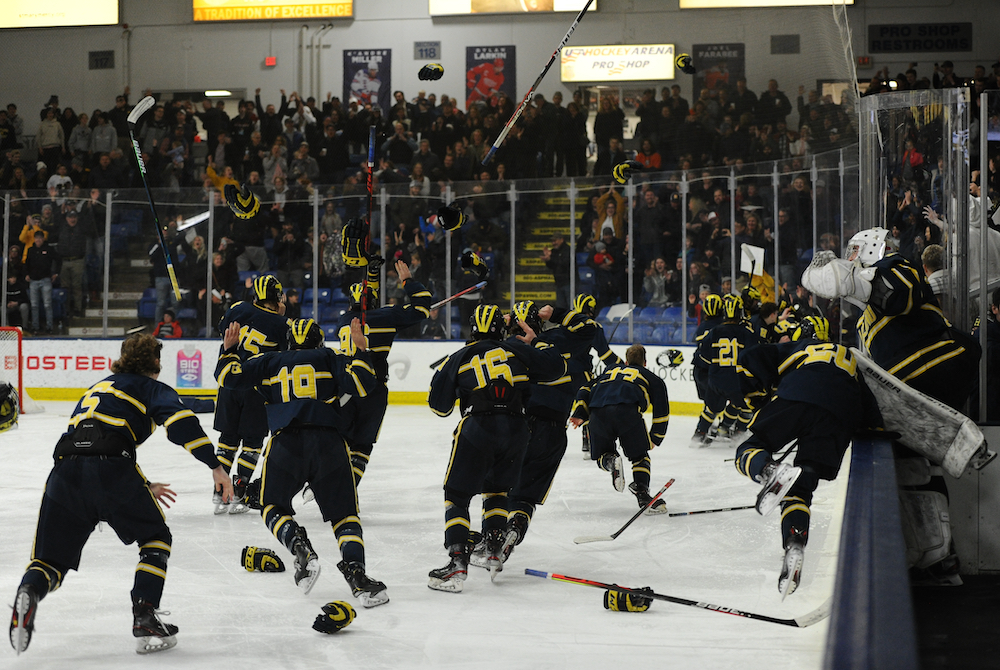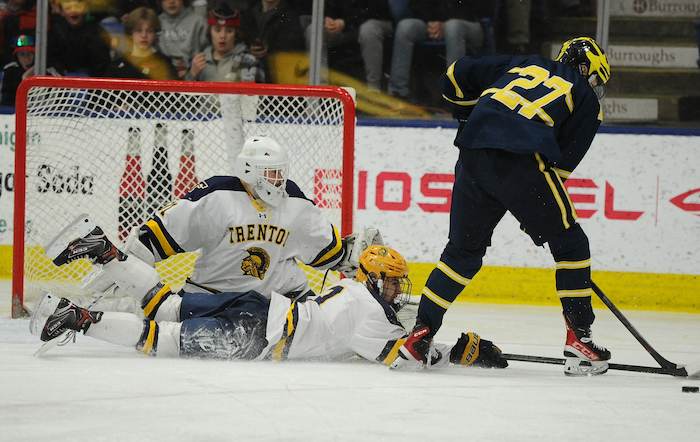
Hartland Adds 3rd Title to Growing Championship Tradition
March 12, 2022
PLYMOUTH — For decades, young hockey players in Trenton have grown up dreaming of playing for the high school team.
That dynamic is playing out these days in Hartland, which has become an elite hockey community during coach Rick Gadwa’s 11 seasons at the helm.
Hartland took the ice for the MHSAA Division 2 championship game Saturday at USA Hockey Arena with a couple dozen youth hockey players hanging over the railing near the tunnel cheering on their heroes.
The Eagles left the ice once again as champions, winning their third MHSAA title in the past five seasons with a 3-2 overtime victory over Trenton.
Hartland has won three championships and been runner-up twice over the past 10 seasons. The Eagles also reached the Semifinals two years ago when COVID-19 restrictions shut down winter tournaments including hockey before its conclusion.
“We’ve had a ton of success,” Gadwa said. “What’s impressive about this group is none of these guys have been to USA Hockey Arena. We had quite a bit of returners who were with us last year when we lost to a very good Byron Center team (in the Quarterfinal).
“So, there’s a tradition of excellence right now. To see them get here this year and fight the way they had to fight and get it done just makes our tradition so much stronger. It’s something for guys coming in next year to try to get to.”
Freshman Ian Kastamo was one of the young Hartland kids who watched the Eagles during their annual visits to USA Hockey Arena. He was particularly riveted to the team in 2019 when his brother Sam was on the championship winner.
 “I watched games my whole life,” Kastamo said. “I’ve seen the big crowd, the energy, how fun it looks. This is my dream come true to play for this team, much less win the state championship.”
“I watched games my whole life,” Kastamo said. “I’ve seen the big crowd, the energy, how fun it looks. This is my dream come true to play for this team, much less win the state championship.”
Kastamo not only won a state championship, but he experienced one of the greatest moments in a hockey player’s life by delivering it with an overtime goal. Kastamo scored 3:22 into overtime when he knocked in the rebound of a shot from the left point by Jorden Haydu.
“The puck was in their zone, and I went straight to the net,” Kastamo said. “Shot from the point, rebound and I just lunged and banged it home. It’s what you dream about on the backyard rinks, acting like you scored the overtime winner.”
The Eagles had to rebound mentally after allowing the game-tying goal late in the third period.
Having taken a 2-1 lead on Ashton Trombley’s goal at 16:08 of the second period, Hartland was two minutes away from winning in regulation time.
A penalty with 1:57 remaining put Trenton on the power play. Moments after Hartland’s Ben Pouliot missed an empty net by inches on a shot from deep in the Eagles’ zone, Trenton tied it on a goal by Hayden Oboza with 1:32 left in the third.
Trenton almost didn’t make it to overtime, but sophomore goalie Noah Miklos came up with an enormous save when Lucas Henry got the puck alone in front of the net in the final minute. Miklos finished with 31 saves.
“I don’t really know what happened,” Trenton coach Chad Clements said. “One of our D got caught up ice. There was a turnover. He’s all alone with a minute left. For him to make that save was unbelievable. Obviously, it allowed us a chance to go into overtime and allowed us a chance to try to win the game.
“In the playoffs, he’s been unbelievable. We have two young goaltenders who split time this year. For Noah to step forward and play well for us in the playoffs was really nice.”
Trenton opened the scoring on a power play goal by Carter Allen at 13:52 of the first period, but Henry tied it 28 seconds later.
Hartland goalie Kameron Ragon made 17 saves, finishing his senior season with a 21-0 record. Hartland lost five games, none with Ragon in net.
PHOTOS (Top) Hartland’s bench empties after the Eagles clinch the Division 2 championship Saturday. (Middle) Trenton goalie Noah Miklos and defenseman Xaver Gradinscak wall off a Hartland attack in front of their net. (Click for more from Hockey Weekly Action Photos.)
State Champs! Network: 2023 Ice Hockey Finals Highlights
March 29, 2023
Join Jonathon Kidd and Sean Baligian as we take a look at all of the action from the 2023 Hockey State Finals
Congratulations to our State Champions
Division 1 - Detroit Catholic Central
Division 2 - Brother Rice
Division 3 - Flint Powers

